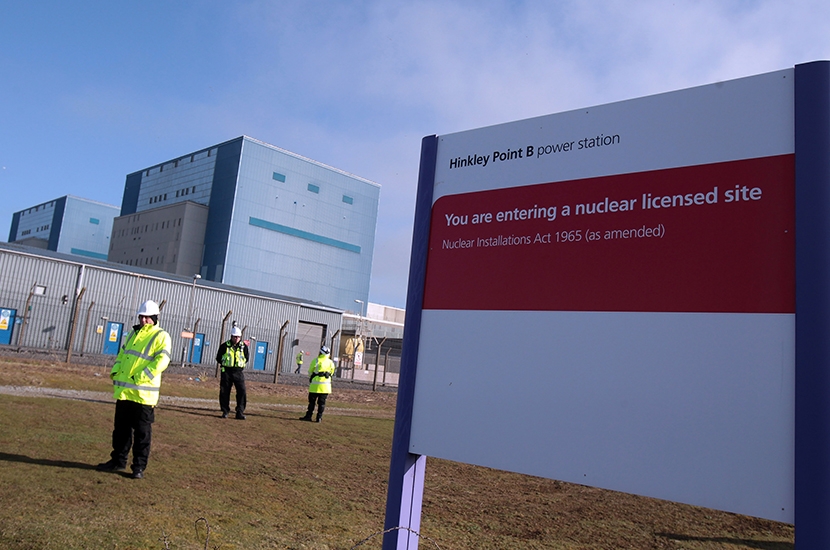The most shocking thing about the news that the government is looking to remove China from Britain’s nuclear power programme is that it has taken so long. But it will not be a straight-forward process. It will likely provoke tantrums from Beijing, as well as grumbles from a nuclear lobby that will have to find somebody else to stump up the billions needed for their pet projects.
China General Nuclear should never have been allowed anywhere near such a critical piece of national infrastructure. The state-owned company has been accused by the US government of stealing technology for military use and placed on a national security blacklist which severely limits US companies from doing business with it. Washington has warned Britain against partnering with the company.
More recently CGN has shown a lack of transparency over technical issues at a major nuclear plant in Guangdong province, less than 100 miles from Hong Kong. That we know the Taishan plant has issues at all is down to the junior French partner EDF, which was required to inform the US authorities when it sought technical assistance. It reportedly warned of an ‘imminent radiological event’ and said the Chinese safety authority was raising the acceptable limits for radiation detection outside the plant to avoid having to shut it down.
This month EDF forced an extraordinary board meeting in Taishan in an effort to get to the bottom of what it called an ‘evolving’ issue. In a statement after the meeting, EDF said that in France it would have shut down the reactor for further investigation, but in China that decision lies with CGN, which is continuing operations. Since June, when the problem emerged, CGN has remained largely silent, the plant issuing bland statements of reassurance that all is ‘normal’.
If Britain excludes China from its nuclear programme, the gloves may well come off
On a technical level, the issue appears to be centred on a small number of damaged fuel rods, and cannot be compared with the Chernobyl meltdown, but the opaque way in which it has been handled by CGN is right out of the corrupt, secretive playbook of the bureaucrats who oversaw the nuclear disaster in Ukraine in 1986. Furthermore, the plant in Taishan is the same model being built at Hinkley Point in south-west England, where CGN is the junior partner to EDF, and proposed for Sizewell in Suffolk.
China’s involvement in Britain’s nuclear programme is a product of the Cameron-Osborne ‘golden era’ of relations, when it seems due diligence on any investment from Beijing depended on the number of zeros on the cheque. The precise deal struck is almost as opaque as CGN, but appears to involve a quid pro quo whereby China would stump up cash for French-led projects at Hinkley Point and Sizewell and in exchange be allowed to build its own nuclear power station at Bradwell on the Essex coast.
Hinkley Point construction is under way and well over budget. It is on course to be the world’s most expensive energy project at £22 billion, and CGN has a 33 per cent stake. When completed in 2026 it will produce enough electricity to meet around 7 per cent of Britain’s needs — at a considerable price to consumers. To make it worthwhile for the French-Chinese owners, the government has agreed to pay an inflation-linked guaranteed price twice the current UK wholesale price — and well in excess of renewables.
Sizewell in Suffolk has yet to begin construction. As is so often the way with Chinese investment, the goals are strategic, with Bradwell as the real prize — the first Chinese-designed plant outside its own borders, which Beijing sees as a springboard for international sales of its technology.
There are parallels here with Huawei. In 2005, BT awarded the company a contract as part of its £10 billion network modernisation. BT’s decision to exclude Marconi sounded the death knell for Britain’s once mighty technology giant, and provided a launch pad for Huawei’s international expansion.
The technical design of the Chinese reactor has yet to get regulatory approval, but in a little-noticed decision in December, Ofgem, the electricity market regulator, granted a generating licence to a company created by CGN to build the reactor in the Essex marshlands. The decision was hailed by the China-controlled Bradwell Power Generation Company as a ‘milestone’.
The government reportedly is now looking for ways of removing CGN from Sizewell and blocking Bradwell, but since all three projects are linked in the original deal, a spurned CGN is unlikely to stick around at Hinkley Point if it is turfed off the others. That will create an enormous financial black hole, and the government will have to either find other investors or stump up the money itself. That’s no easy task.
Protecting critical national infrastructure is supposedly a national priority. GCHQ’s National Cyber Security Centre is charged with doing just that, and its head, Lindy Cameron, recently boasted that ‘our ability to do this is the envy of the world’. She named China as a key adversary. Infrastructure doesn’t get much more critical than nuclear power stations, and Cameron’s words sit rather uncomfortably with the presence of CGN — a company accused in the US of benefiting from the very cyber espionage GCHQ seeks to protect us from.
The importance of the nuclear deal to China goes some way to explain why Beijing was relatively restrained in its response to Britain’s banning of Huawei from its next generation 5G networks in spite of dark threats to make us ‘suffer’. But if Britain excludes China from its nuclear programme, the gloves may well come off. Look no further than Australia to see Beijing’s commercial and political vindictiveness.
But Australia also tells another story. It was hit by a trade boycott after calling for an independent inquiry into the origin of Covid-19. It stood firm, and in spite of early fears the boycott has had limited impact economically. The experience has alerted Australia to the reality of Xi Jinping’s China, and the country is examining every facet of its overdependence on Beijing.
Little wonder that the UK government regards the nuclear decision as ‘sensitive’. Boris Johnson still appears to believe commercial relations with China can somehow be separated from politics. This was always a fallacy. Beijing does not hesitate to use trade and investment for coercion — and nuclear power is no exception.






Comments